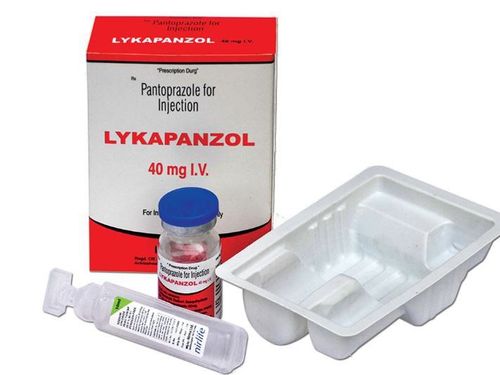This is an automatically translated article.
Kazmeto is classified in the group of drugs used in digestive diseases, namely gastric ulcers, duodenal ulcers, reflux esophagitis. Through the article below, learn about the uses, usage and dosage of Kazmeto.
1. What is Kazmeto?
Kazmeto is a drug indicated for use in the treatment of ulcerative diseases in the gastrointestinal tract, specifically duodenal - gastric ulcer,... Kazmeto is prepared in the form of enteric-coated tablets, with the main active ingredient. Rabeprazole Sodium contains 20mg content in each tablet.
Kazmeto is packed 10 tablets in 1 blister, a box includes 3 blisters.
2. Uses of Kazmeto
Kazmeto has the main active ingredient is Rabeprazole Sodium, a substance that inhibits H +, K +, ATPase. The main effect of this active ingredient through inhibition of H +, K +, ATPase is to inhibit gastric acid secretion. Rabeprazole Sodium in clinical studies showed a strong inhibitory effect on gastric acid secretion stimulated by histamine or pentagastrin in dogs with chronic gastric fistula. In rats, Raberpraziole also inhibited gastric acid secretion under normal or histamine-stimulated conditions. Not only inhibiting acid secretion in the gastric wall, Rabeprazole Sodium also showed improvement in gastric mucosal lesions for mucosal lesions in cases of stress or heavy alcohol use.
In duodenal ulcer disease, Kazmeto has the effect of healing ulcers, in combination with other drugs in the treatment of Helicobacter pylori infection.
3. Indications for taking Kazmeto
Kazmeto with active ingredient Rabeprazole Sodium, is indicated in the following cases:
Patients with gastroesophageal reflux disease (GERD); Patients with gastroesophageal reflux disease - oesophagus; Patients with gastric and duodenal ulcers; Zollinger-Ellison syndrome.
4. Contraindications to taking Kazmeto
According to clinical reports, Kazmeto is contraindicated only in cases of hypersensitivity to Rabeprazole Sodium or Benzimidazole derivatives. Co-administration of Kazmeto with Atazavanir is contraindicated. Kazmeto is contraindicated in patients with hereditary galactose intolerance, impaired glucose and galactose absorption. Kazmeto is contraindicated in pregnant women because there are no studies on the safety of the drug in this population. Kazmeto is contraindicated in lactating women, because in clinical studies, the component Rabeprazole in Kazmeto was excreted in the milk of rats.
5. Dosage and how to use Kazmeto
With the dosage form of enteric coated tablets, Kazmeto is indicated for oral use.
Dosage of Kazmeto in specific medical conditions:
Using Kazmeto in gastroesophageal reflux disease (GERD): 20mg/day, the dose lasts for 4-8 weeks, consider taking an additional 8 weeks after at the end of the first 8 weeks. Using Kazmeto in duodenal ulcer disease: 20mg/day for 4 weeks. In duodenal ulcer disease, patients are recommended to take 1 time per day after breakfast. Using Kazmeto in Zollinger - Ellison syndrome: Start with 60mg x 1 time, take it for 1 day, then the doctor will give a specific dose depending on the patient's response, the maximum dose can be increased to 120mg / day , divided into 2 doses. Usually, the doctor will prescribe medication until the clinical symptoms of Zollinger - Ellison are gone. Using Kazmeto in combination with other drugs in the treatment of duodenal ulcer and benign gastric ulcer associated with H. pylori infection: Kazmeto 20mg/time, 2 times/day, combined with antibiotic Clarithromycin 500mg/time , take 2 times / day and Amoxicillin 1g / time, take 2 times / day. This dosage is divided into 2 times a day, morning and evening.
6. Side effects of the drug Kazmeto
Side effects of the drug Kazmeto are also related to the digestive system, some side effects affect the whole body, specifically as follows:
Whole body: Rash, urticaria; Blood: Hematological changes; Liver: Changes in liver function; Digestion: Causes constipation, diarrhea, abdominal distension, heaviness in the abdomen; Nervous: Headache, somnolence.
7. Notes when using the drug Kazmeto
A good Kazmeto response does not rule out existing or existing gastric or esophageal malignancies in the patient. Therefore, it is necessary to exclude malignancies before using Kazmeto. Kazmeto should be used with caution because of the potential risk of cross-hypersensitivity reactions with other proton pump inhibitors or Benzimidazole derivatives. Kazmeto should not be used in children because its mechanism of action and serious side effects are unknown. Liver enzyme disturbances may occur during the patient's use of Kazmeto. However, there is no specific indication with a reasonable amount to use the drug for patients with severe liver failure, so it should be used with caution in this subject. Taking Kazmeto may increase the risk of intestinal infections with strains such as Clostridium difficile, Campylobacter, Salmonella. The side effects of Kazmeto affect the nervous system even in mild form (headache, somnolence), so Kazmeto should not be used in subjects who are involved in operating machinery and driving. Kazmeto is a drug used in the treatment of gastric ulcers, gastroesophageal reflux disease, duodenal ulcers. Kazmeto is a drug used by prescription and prescribed by a specialist, patients are not allowed to arbitrarily adjust the dose of the drug at will.













